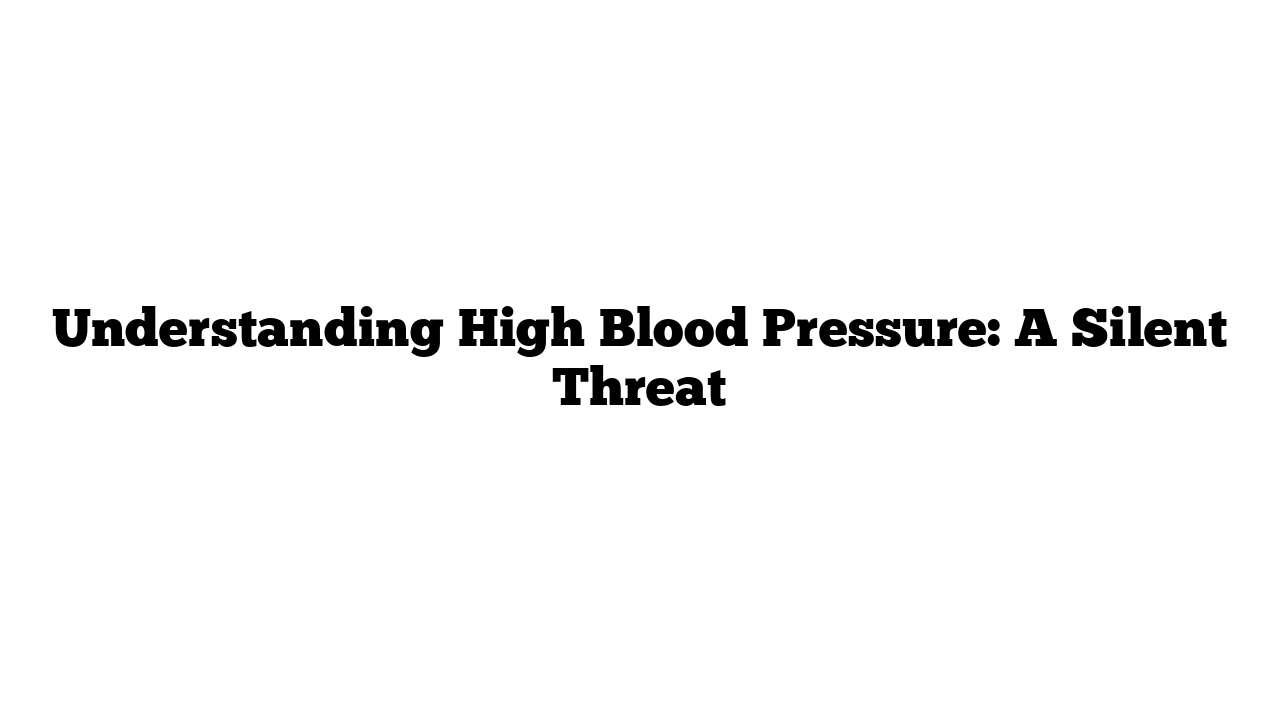High blood pressure, also known as hypertension, is one of the most prevalent medical conditions worldwide. Surprisingly, around half of those affected are unaware of their condition, as high blood pressure rarely presents noticeable symptoms. This lack of awareness can be dangerous because untreated high blood pressure can lead to serious health issues.
What is Blood Pressure?
To understand high blood pressure, we first need to know what blood pressure is. Blood pressure is the force exerted by circulating blood against the walls of blood vessels as the heart pumps it throughout the body. This force varies with each heartbeat, reaching its highest point during systole (when the heart beats) and its lowest point during diastole (when the heart relaxes between beats).
A typical blood pressure reading consists of two numbers: systolic pressure (the first number) and diastolic pressure (the second number). For a healthy individual, normal systolic pressure ranges between 90 and 120 mmHg, while normal diastolic pressure ranges between 60 and 80 mmHg. A reading consistently above 140/90 mmHg is classified as high blood pressure or hypertension.
Causes of High Blood Pressure
Hypertension can develop due to a variety of factors. Healthy blood vessels have some elasticity, allowing them to adapt to changes in blood pressure. However, certain risk factors can reduce this elasticity and increase resistance in blood vessels, resulting in consistently high blood pressure. These risk factors include:
- Increasing Age: Blood vessels naturally become less elastic as we age.
- Poor Diet: Diets high in salt, sugar, and unhealthy fats can contribute to hypertension.
- Smoking: Tobacco use can damage blood vessels, leading to increased blood pressure.
- Excessive Alcohol Consumption: Drinking too much can raise blood pressure.
- Being Overweight: Extra body weight increases the workload on the heart.
- Physical Inactivity: A sedentary lifestyle can contribute to hypertension.
- Ethnic Background and Family History: Genetics can play a significant role in blood pressure levels.
- Health Conditions and Medications: Conditions like diabetes and certain medications can also influence blood pressure.
Why is High Blood Pressure Dangerous?
High blood pressure is often called a “silent killer” because it typically doesn’t cause noticeable symptoms. However, over time, it puts significant strain on blood vessels, leading to tiny tears in their walls. These tears increase the risk of fatty deposits and blood clots, which can narrow or block blood vessels. The consequences can be severe:
- Stroke: If a blood vessel in the brain is blocked, it can lead to a stroke.
- Heart Attack: Blockages in the heart’s vessels can cause a heart attack.
- Kidney Disease: High blood pressure can damage the kidneys, leading to kidney disease.
- Heart Failure: The heart has to work harder to pump blood, which can eventually lead to heart failure.
Measuring Blood Pressure
Blood pressure is measured using a blood pressure cuff, which is inflated around the upper arm. Readings can be taken manually or electronically. Because blood pressure fluctuates throughout the day, it’s essential to take several readings over time to get an accurate measure. Many electronic kits are available for easy home monitoring.
Controlling Blood Pressure
So, how can we treat and control high blood pressure? Here are some lifestyle changes that can help maintain a healthy blood pressure:
- Eat a Healthy Diet: Focus on whole foods, reducing processed and salty foods while increasing your intake of fruits and vegetables.
- Stay Active: Regular physical activity is crucial for heart health.
- Maintain a Healthy Weight: Keeping your weight in check can lower your blood pressure.
- Quit Smoking and Limit Alcohol: Both can contribute to elevated blood pressure.
In some cases, doctors may prescribe medications to help control blood pressure. These can work by slowing the heart rate, reducing blood volume, or relaxing and widening blood vessels. It’s important to take medications as prescribed and to discuss any side effects with your doctor.
Final Thoughts
High blood pressure is a significant health issue, but it is manageable and often preventable. By adopting healthy habits now, you can help prevent serious consequences later in life. Regular monitoring and a proactive approach to your health are key to staying safe and well.
